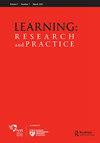A mindful inquiry towards transformative curriculum vision for inclusive mathematics education
Q2 Social Sciences
引用次数: 9
Abstract
ABSTRACT Exploring ways to develop a transformative curriculum vision for mathematics education that is inclusive to opposing perspectives and ideologies, this mindful inquiry explores “mindless” views embedded in the mathematics curriculum of Nepal; explores narrowly conceived disempowering assumptions within it; engages in dialectical interactional texturing among perspectives; and eventually emerges with its transformative potentiality. In so doing, this reflection on hegemonic worship of modernity identifies Newtonian reductionism, absolutism, and non-fluidity of language, serving mono-cultural perspectives as restraints underlying inclusive mathematics curriculum. Reflecting on this meaning-making, and in seeking an equilibrium view of reality, the inquiry hopefully offers pluralism, synergy, and montage as imperative in making mathematics education more meaningful.对全纳数学教育变革课程愿景的正念探究
探索如何为数学教育开发一种包含对立观点和意识形态的变革性课程愿景,这种有意识的调查探讨了尼泊尔数学课程中嵌入的“无脑”观点;探索其中狭隘的消极假设;在不同视角之间进行辩证的互动织构;并最终带着变革的潜力出现。在这样做的过程中,这种对现代性霸权崇拜的反思确定了牛顿的还原论、绝对主义和语言的非流动性,将单一文化观点作为包容性数学课程的约束。反思这种意义的创造,并寻求一种平衡的现实观,探究希望提供多元化、协同和蒙太奇作为使数学教育更有意义的必要条件。
本文章由计算机程序翻译,如有差异,请以英文原文为准。
求助全文
约1分钟内获得全文
求助全文

 求助内容:
求助内容: 应助结果提醒方式:
应助结果提醒方式:


